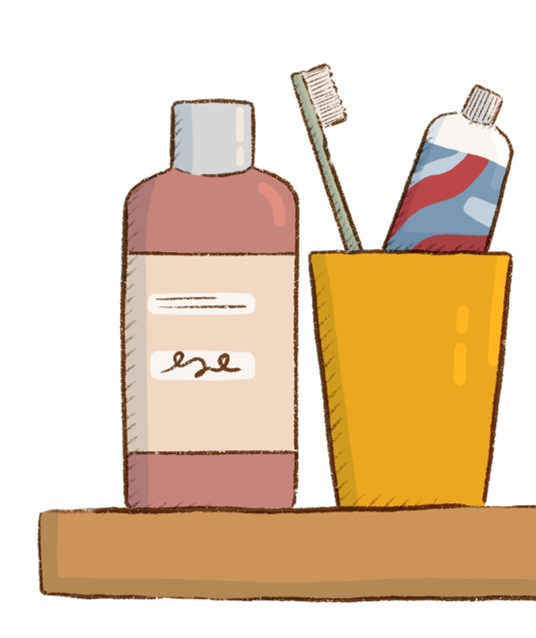The information provided on this page is available to download as a printable booklet.
While cleaning your teeth is a life-long habit for most, some people living with dementia may forget to do this, or lose the co-ordination or motor skills to do so properly. Teeth-cleaning is something many carers may have to help with, whether simply reminding someone to do it or physically helping.
Visiting the dentist can also be a major challenge for people living with dementia. However, looking after dental health is important to prevent further problems, such as tooth pain and extra difficulty with eating and drinking due to tooth decay or infection.
This page covers:
Teeth care
Top tips for making it easy for people to remember to brush teeth
- Keep to familiar types of toothpaste and toothbrush that the person prefers.
- Have them within easy view and reach of the sink.
- Put the person’s toothbrush with the toothpaste (possibly with lid off) next to the sink in the bathroom.
- If the person has difficulty squeezing the toothpaste out of the tube then you might just leave the loaded toothbrush for them.
- Sometimes cleaning your own teeth at the same time as the person you are caring for can help to prompt the activity.
- Early on in a person’s dementia, it is a really good idea to record their preferred tooth care routines in as much detail as possible.
Top tips for helping someone clean their teeth
- Don’t rush – ensure you can allow adequate time and plan ahead so that you can do so.
- Before the activity, take to time to consider and think through what might work best for you both, to help with this.
- If the person is already angry or distressed at the time you planned to help brush their teeth then it is probably best to postpone the activity.
- Trying to force someone to brush their teeth will only reinforce negative feelings and be very unpleasant for all concerned.
- Although it’s ideal to clean after meals, many people only clean once a day.
- It will be easier to link teeth cleaning with washing if this is done in the bathroom.
- If the person cannot get to the bathroom, bring a toothbrush, toothpaste and two cups (one with water in) to them. They can use the cup with water in to rinse and spit into the cup without water in.
- Special toothbrushes that are easier to grip and have softer bristles are available. Speak to a dentist or pharmacist about what’s available.
- Break down the task of teeth cleaning or denture care into small steps to follow one by one.
- Distress sometimes results from people not understanding what is happening or what to expect.
- Try explaining what you are going to do, and why, before you do it.
- Use non-verbal cues such as mime with hand gestures and show the person you care for what products or equipment you are going to use.
- There is no need to rinse toothpaste away after brushing if the person does not want to do this.
- Using humour where possible can also help keep things light, diffuse awkwardness and tension, and put people at ease.
- Follow the activity with something enjoyable for the person you care for, that they might look forward to. Refer to this enjoyable activity in conversation during teeth brushing as a focus towards completion.

In the following short clip, Paul shares his experiences of helping his wife Jill to clean her teeth. Jill has Posterior Cortical Atrophy and has difficulties with visio-spatial awareness. Please note this clip is not endorsing any specific products, but showing what works for Paul and his wife in their situation.
Dentures
Many of the tips that apply to tooth care also apply to denture care. The person’s mouth will be much more comfortable if the dentures are removed and cleaned regularly.
- Prompt the person to remove dentures as part of their daily routine.
- Encourage them to rinse their mouth and clean around their gums.
- If they cannot do this themselves, then they may let you do it for them. You may feel better using gloves (or a gloved finger) to do this.
- Clean the dentures thoroughly. Soaking overnight is best but if the person wants to have their dentures back in then that is fine.
- Many people sleep in their dentures.
Accessing a dentist
- People can be anxious about visiting the dentist.
- Many dentists now have experience of treating patients with dementia.
- Speak to your dentist about whether they can treat people with the kinds of challenges dementia can bring, and what they might advise.
- If visiting a regular dental practice is unworkable, there are more specialist community dental services available, from hospital services, to mobile clinics in the community, to dentists who do home visits. Speak to your GP, social worker, or local council about what’s available.
Additional resources
Some of these websites offer additional advice:
- Care Rights UK have a good care guide called ‘Keep Smiling’. Visit their website to access it www.carerightsuk.org
- The Alzheimer’s Society has information on their website around dental and mouth care www.alzheimers.org.uk
- Dementia UK has information about mouth care www.dementiauk.org
Scottish Dental has a ‘Caring for Smiles’ guide for families, and also one for carers www.scottishdental.nhs.scot - The British Society of Gerodontology has a series of resources focusing on oral health www.gerodontology.com

